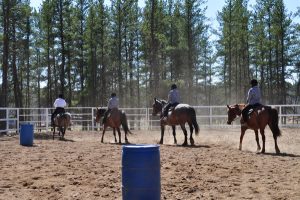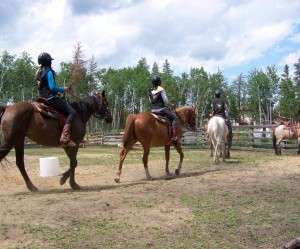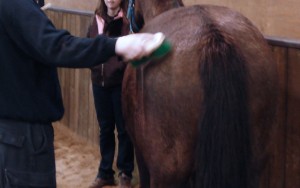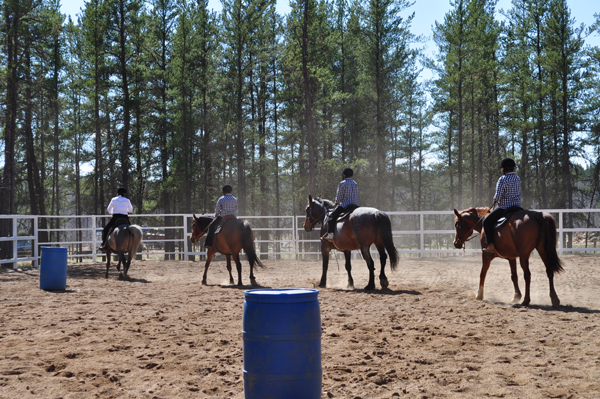There are many unique aspects to our Buckland campus – geographical location, proximity to a national forest, and natural beauty, to name a few.
 Riding arena
Riding arena
One of the first things a new visitor to campus may notice, however, is a slight smell of horses. Venture a little further in and you’ll notice a two-story arena within walking distance from the campus’ group homes. The structure is the Donalda Hansen Centre (named after former board member Donalda Hansen).
Though we offer Equine Assisted Learning (EAL) to some of our southern clientele through the Regina Equestrian Club, Buckland’s Donalda Hansen Centre is literally outside the door for clients who live in Klassen or Alex Guy houses. The two-level facility has a state-of-the-art riding arena on the main level and a classroom for Ranch youth on the second level.
So naturally, clients at our northern campus get a lot of one-on-one time with horses – and, perhaps surprisingly, it can be one of our biggest keys to unlocking the potential of each youth.
 “The youth we work with at times are quite difficult to reach and even harder to motivate. Some resist treatment, and some have difficulty forming relationships and trusting others,” explained former director of programs north Randy O’Shaughnessy. “But when you’re working with a horse, you have to develop a relationship – a horse won’t have anything to do with you unless it has that element of trust.”
“The youth we work with at times are quite difficult to reach and even harder to motivate. Some resist treatment, and some have difficulty forming relationships and trusting others,” explained former director of programs north Randy O’Shaughnessy. “But when you’re working with a horse, you have to develop a relationship – a horse won’t have anything to do with you unless it has that element of trust.”
“Horses never lie, and they work best with a trusting and respectful relationship,” equine program leader Amanda Snell added.
“So basically, working with horses breaks down these defense barriers with youth. Through this, they’re forming a close bond and a relationship they may have always wanted – and its good practice for and can be related to working with humans, as well.”
 But the benefits don’t stop there.
But the benefits don’t stop there.
Equine-assisted learning also provides clients with a self-confidence and helps with developing emotional intelligence and empathy.
Randy concluded, “Horses are quite in-tune with their environment, so when the youth learn to read the horse and its body language, it provides an underlying sense of empathy and leads to kids being able to look at themselves and say, ‘how am I feeling, and how is it affecting others?’
** *
Join us on September 19th from 3 – 5 p.m. as we celebrate 20 years of going forward with pride in the north with a barbeque at the campus!


